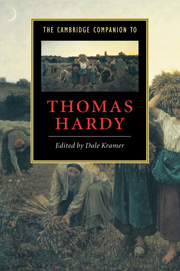tutorial, characters, video, and resource materials
Tess of the d’Urbervilles first appeared in a censored version and serialised form in the British illustrated newspaper The Graphic in 1891. It is probably the most popular of Hardy’s late, great novels. The sub-title is ‘A Pure Woman’, and it is a story which explores the tragic consequences of a young milkmaid who becomes the victim of the men she encounters. First she falls for the spiritual but flawed Angel Clare, and then the physical but limited Alec Durberville takes advantage of her.
This novel has some of the most beautiful and the most harrowing depictions of rural working conditions which reveal Hardy as a passionate advocate for those who work the land. It also has a wonderfully symbolic climax at Stonehenge on Salisbury Plain. There is poetry in almost every page. This is Hardy at his best.
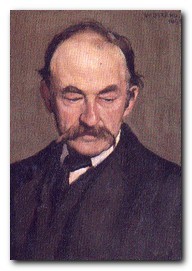
Thomas Hardy
Tess of the d’Urbervilles – plot summary
Jack Durbeyfield, a poor carter, is stunned to learn that he is the descendent of an ancient noble family, the d’Urbervilles. When his horse is killed in an accident he and his wife send Tess to the d’Urberville mansion, where they hope Mrs. d’Urberville will make Tess’s fortune. In reality, Mrs. d’Urberville is no relation to Tess at all: her husband simply changed his name to d’Urberville after he retired. But Tess does not know this, and when the rakish Alec d’Urberville procures Tess a job tending fowls, Tess feels she has no choice but to accept, since she blames herself for the horse’s death.
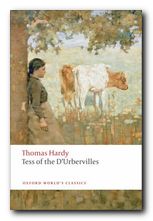 She spends several months at this job, resisting Alec’s attempts to seduce her. Finally, Alec takes advantage of her in the woods one night after a fair. Tess returns home to give birth to Alec’s child, which dies soon after it is born. Tess then spends a miserable year at home before deciding to seek work elsewhere. She finally accepts a job as a milkmaid at the Talbothays Dairy.
She spends several months at this job, resisting Alec’s attempts to seduce her. Finally, Alec takes advantage of her in the woods one night after a fair. Tess returns home to give birth to Alec’s child, which dies soon after it is born. Tess then spends a miserable year at home before deciding to seek work elsewhere. She finally accepts a job as a milkmaid at the Talbothays Dairy.
At Talbothays, Tess enjoys a period of contentment and happiness. She befriends three of her fellow milkmaids – Izz, Retty, and Marian – and meets a man named Angel Clare. They grow closer, and she eventually accepts his proposal of marriage. But she feels she should tell Angel about her past, and writes him a confessional note. She slips it under his door but it slides under the carpet and Angel never sees it.
On their wedding night, Angel and Tess both confess indiscretions. Angel tells Tess about an affair he had with an older woman in London, and Tess tells Angel about her history with Alec. Tess forgives Angel, but Angel cannot forgive Tess. He gives her some money and boards a ship bound for Brazil.
Tess has a difficult time finding work and is forced to take a difficult job at an unpleasant farm. She tries to visit Angel’s family but overhears his brothers discussing Angel’s poor marriage, so she leaves. She hears a wandering preacher speak and is stunned to discover that he is Alec d’Urberville, who has been converted to Christianity by Angel’s father, the Reverend Clare. Alec and Tess are each shaken by their encounter, and Alec begs Tess never to tempt him again. Soon after, however, he asks Tess to marry him.
Tess learns from her sister Liza-Lu that her mother is near death, and Tess is forced to return home to take care of her. Her mother recovers, but her father unexpectedly dies soon after. When the family is evicted from their home, Alec offers help. But Tess refuses to accept, knowing he only wants to obligate her to him again.
Angel Clare returns from Brazil prepared to forgive his wife. He finds Tess in an expensive boardinghouse where he begs her to take him back. Tess tells him he has come too late. She was unable to resist and went back to Alec d’Urberville. Angel leaves in a daze, and, heartbroken to the point of madness, Tess goes upstairs and stabs her lover to death. When the landlady finds Alec’s body, she raises an alarm, but Tess has already fled to find Angel.
They hide out in an empty mansion for a few days, then travel farther. When they come to Stonehenge, Tess goes to sleep, but when morning breaks shortly thereafter, a police search party discovers them. Tess is arrested and sent to jail. Angel and Liza-Lu watch as a black flag is raised over the prison, signaling Tess’s execution.
Study resources
![]() Tess of the d’Urbervilles – Oxford Classics – Amazon UK
Tess of the d’Urbervilles – Oxford Classics – Amazon UK
![]() Tess of the d’Urbervilles – Oxford Classics – Amazon US
Tess of the d’Urbervilles – Oxford Classics – Amazon US
![]() Tess of the d’Urbervilles – Kindle eBook
Tess of the d’Urbervilles – Kindle eBook
![]() Tess of the d’Urbervilles – Wordsworth Classics – Amazon UK
Tess of the d’Urbervilles – Wordsworth Classics – Amazon UK
![]() Tess of the d’Urbervilles – Wordsworth Classics – Amazon US
Tess of the d’Urbervilles – Wordsworth Classics – Amazon US
![]() Tess of the d’Urbervilles – a hypertext version
Tess of the d’Urbervilles – a hypertext version
![]() Tess of the d’Urbervilles – eBooks at Gutenberg
Tess of the d’Urbervilles – eBooks at Gutenberg
![]() The Complete Critical Guide to Thomas Hardy – Amazon UK
The Complete Critical Guide to Thomas Hardy – Amazon UK
![]() Tess – film by Roman Polanski – Amazon UK
Tess – film by Roman Polanski – Amazon UK
![]() Thomas Hardy: A Biography – definitive study – Amazon UK
Thomas Hardy: A Biography – definitive study – Amazon UK
![]() Tess of the d’Urbervilles – 2008 BBC drama on DVD – Amazon UK
Tess of the d’Urbervilles – 2008 BBC drama on DVD – Amazon UK
![]() Tess of the d’Urbervilles – York Notes (Advanced) – AMazon UK
Tess of the d’Urbervilles – York Notes (Advanced) – AMazon UK
![]() Tess of the d’Urbervilles – Brodies Notes – Amazon UK
Tess of the d’Urbervilles – Brodies Notes – Amazon UK
![]() Tess of the d’Urbervilles – Cliffs Notes – AMazon UK
Tess of the d’Urbervilles – Cliffs Notes – AMazon UK
![]() Tess of the d’Urbervilles – 1998 BBC drama on DVD – Amazon UK
Tess of the d’Urbervilles – 1998 BBC drama on DVD – Amazon UK
![]() Tess of the d’Urbervilles – audioBook at LibriVox
Tess of the d’Urbervilles – audioBook at LibriVox
![]() The Cambridge Companion to Thomas Hardy – Amazon UK
The Cambridge Companion to Thomas Hardy – Amazon UK
![]() The Complete Critical Guide to Thomas Hardy – Amazon UK
The Complete Critical Guide to Thomas Hardy – Amazon UK
![]() Authors in Context – Thomas Hardy – Amazon UK
Authors in Context – Thomas Hardy – Amazon UK
![]() Oxford Reader’s Companion to Hardy – Amazon UK
Oxford Reader’s Companion to Hardy – Amazon UK
Principal characters
| Jack Durbeyfield | dissolute head of family, with wife and large family |
| Joan Durbeyfield | his hardworking wife |
| Tess Durbeyfield | their eldest daughter |
| Eliza Louisa Durbeyfield | Tess’s younger sister, who closely resembles her |
| Angel Clare | bookish third son of a clergyman who becomes Tess’s husband |
| Alec Stokes-d’Urberville | rakish but later reformed son of estate owners |
| Richard Crick | owner of Talbothay Farm where Tess meets Angel |
| Car Darch | former mistress to Alec |
| Farmer Groby | churlish employer of Tess at Flintcombe-Ash farm |
| Sorrow | illegitimate child of Tess and Alec, who dies |
Tess of the d’Urbervilles – film version
Roman Polanski’s film version of Tess (1979) is beautifully faithful to the original novel and particularly unsparing in its depiction of country life as hard manual work – which chimes sympathetically with the unsentimental views held by Hardy himself.
The centrepiece is an outstanding performance by seventeen year old Natassia Kinski (Klaus Kinski’s daughter) who was Polanski’s lover at the time. She is astoundingly beautiful without seeming to ever realise it, which is exactly one of the causes of Tess’s downfall in the novel.
The film was shot in Brittany rather than England – to get round the extradition laws between the UK and the US from which he has been in exile since 1977, after jumping bail when charged with raping a 14 year old girl.
![]() See reviews of the film at the Internet Movie Database
See reviews of the film at the Internet Movie Database
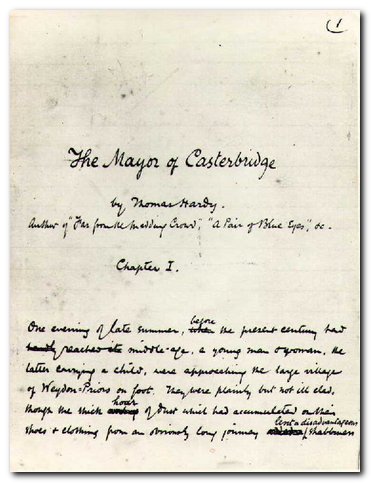
Manuscript of The Mayor of Casterbridge
Literary criticism
![]() Beer, Gillian. ‘Descent and Sexual Selection: Women in Narrative. In Tess of the d’Urbervilles, ed. by Scott Elledge. New York: W.W. Norton and Company, 1991: 446-451.
Beer, Gillian. ‘Descent and Sexual Selection: Women in Narrative. In Tess of the d’Urbervilles, ed. by Scott Elledge. New York: W.W. Norton and Company, 1991: 446-451.
![]() Bloom, Harold. Thomas Hardy’s Tess of the d’Urbervilles. New York: Chelsea House, 1987.
Bloom, Harold. Thomas Hardy’s Tess of the d’Urbervilles. New York: Chelsea House, 1987.
![]() Casagrande, Peter J. Tess of the d’Urbervilles: Unorthodox Beauty. New York: Maxwell Macmillan International, 1992.
Casagrande, Peter J. Tess of the d’Urbervilles: Unorthodox Beauty. New York: Maxwell Macmillan International, 1992.
![]() Laird, J. T. The Shaping of Tess of the d’Urbervilles. Oxford: Clarendon Press, 1975.
Laird, J. T. The Shaping of Tess of the d’Urbervilles. Oxford: Clarendon Press, 1975.
![]() LaValley, Albert J. Twentieth Century Interpretations of Tess of the d’Urbervilles. Englewood Cliffs, New Jersey: Prentice-Hall, 1969.
LaValley, Albert J. Twentieth Century Interpretations of Tess of the d’Urbervilles. Englewood Cliffs, New Jersey: Prentice-Hall, 1969.
![]() Mills, Sara, ed. Feminist Readings/Feminists Reading. New York: Prentice Hall, 1996.
Mills, Sara, ed. Feminist Readings/Feminists Reading. New York: Prentice Hall, 1996.
![]() Parkinson, Michael H. The Rural Novel: Jeremias Gotthelf, Thomas Hardy, C.F. Ramuz. New York: P. Lang, 1984.
Parkinson, Michael H. The Rural Novel: Jeremias Gotthelf, Thomas Hardy, C.F. Ramuz. New York: P. Lang, 1984.
![]() Van Ghent, Dorothy. ‘On Tess of the d’Urbervilles’. in The English Novel: Form and Function. New York: Holt, Rinehart and Winston, 1964.
Van Ghent, Dorothy. ‘On Tess of the d’Urbervilles’. in The English Novel: Form and Function. New York: Holt, Rinehart and Winston, 1964.
![]() Widdowson, Peter, ed. Tess of the d’Urbervilles: Thomas Hardy. Hampshire: Macmillan, 1993.
Widdowson, Peter, ed. Tess of the d’Urbervilles: Thomas Hardy. Hampshire: Macmillan, 1993.
![]() Wright, Terence. Tess of the d’Urbervilles. Hampshire: Macmillan Publishers, 1987.
Wright, Terence. Tess of the d’Urbervilles. Hampshire: Macmillan Publishers, 1987.
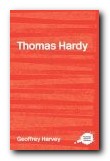 The Complete Critical Guide to Thomas Hardy is a good introduction to Hardy criticism. It includes a potted biography of Hardy, an outline of the stories, novels, and poetry, and pointers towards the main critical writings – from the early influential full length study by D.H. Lawrence to critics of the present day. Also includes a thorough bibliography which covers biography, criticism in books and articles, plus pointers towards specialist Hardy journals.
The Complete Critical Guide to Thomas Hardy is a good introduction to Hardy criticism. It includes a potted biography of Hardy, an outline of the stories, novels, and poetry, and pointers towards the main critical writings – from the early influential full length study by D.H. Lawrence to critics of the present day. Also includes a thorough bibliography which covers biography, criticism in books and articles, plus pointers towards specialist Hardy journals.
![]() Buy the book here
Buy the book here
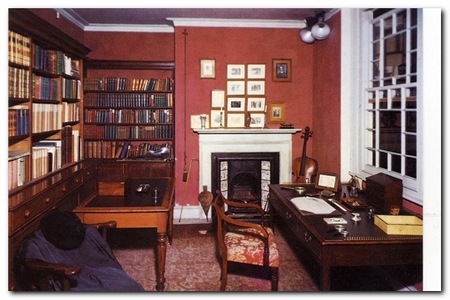
Hardy’s study (Dorset Museum)
Further reading
![]() J.O. Bailey, The Poetry of Thomas Hardy: A Handbook and Commentary, Chapel Hill:N.C., 1970.
J.O. Bailey, The Poetry of Thomas Hardy: A Handbook and Commentary, Chapel Hill:N.C., 1970.
![]() John Bayley, An Essay on Hardy, Cambridge: Cambridge University Press, 1978.
John Bayley, An Essay on Hardy, Cambridge: Cambridge University Press, 1978.
![]() Penny Boumelha, Thomas Hardy and Women: Sexual Ideology and Narrative Form, Brighton: Harvester, 1982.
Penny Boumelha, Thomas Hardy and Women: Sexual Ideology and Narrative Form, Brighton: Harvester, 1982.
![]() Kristin Brady, The Short Stories of Thomas Hardy, London: Macmillan, 1982.
Kristin Brady, The Short Stories of Thomas Hardy, London: Macmillan, 1982.
![]() L. St.J. Butler, Alternative Hardy, London: Macmillan, 1989.
L. St.J. Butler, Alternative Hardy, London: Macmillan, 1989.
![]() Raymond Chapman, The Language of Thomas Hardy, London: Macmillan, 1990.
Raymond Chapman, The Language of Thomas Hardy, London: Macmillan, 1990.
![]() R.G.Cox, Thomas Hardy: The Critical Heritage, London: Routledge and Keegan Paul, 1970.
R.G.Cox, Thomas Hardy: The Critical Heritage, London: Routledge and Keegan Paul, 1970.
![]() Ralph W.V. Elliot, Thomas Hardy’s English, Oxford: Basil Blackwell, 1984.
Ralph W.V. Elliot, Thomas Hardy’s English, Oxford: Basil Blackwell, 1984.
![]() Simon Gattrel, Hardy the Creator: A Textual Biography, Oxford: Clarendon Press, 1988.
Simon Gattrel, Hardy the Creator: A Textual Biography, Oxford: Clarendon Press, 1988.
![]() James Gibson (ed), The Complete Poems of Thomas Hardy, London, 1976.
James Gibson (ed), The Complete Poems of Thomas Hardy, London, 1976.
![]() I. Gregor, The Great Web: The Form of Hardy’s Major Fiction, London: Faber, 1974.
I. Gregor, The Great Web: The Form of Hardy’s Major Fiction, London: Faber, 1974.
![]() Florence Emily Hardy, The Life of Thomas Hardy, London: Macmillan, 1962. (This is more or less Hardy’ s autobiography, since he told his wife what to write.)
Florence Emily Hardy, The Life of Thomas Hardy, London: Macmillan, 1962. (This is more or less Hardy’ s autobiography, since he told his wife what to write.)
![]() P. Ingham, Thomas Hardy: A Feminist Reading, Brighton: Harvester, 1989.
P. Ingham, Thomas Hardy: A Feminist Reading, Brighton: Harvester, 1989.
![]() P.Ingham, The Language of Class and Gender: Transformation in the English Novel, London: Routledge, 1995,
P.Ingham, The Language of Class and Gender: Transformation in the English Novel, London: Routledge, 1995,
![]() D. Kramer, Thomas Hardy: The Forms of Tragedy, London: Macmillan, 1975.
D. Kramer, Thomas Hardy: The Forms of Tragedy, London: Macmillan, 1975.
![]() J. Hillis Miller, Thomas Hardy: Distance and Desire, Cambridge: Harvard University Press, 1970.
J. Hillis Miller, Thomas Hardy: Distance and Desire, Cambridge: Harvard University Press, 1970.
![]() Michael Millgate, Thomas Hardy: His Career as a Novelist, London: Bodley Head, 1971.
Michael Millgate, Thomas Hardy: His Career as a Novelist, London: Bodley Head, 1971.
![]() Michael Millgate, Thomas Hardy: A Biography Revisited, Oxford: Clarendon Press, 2006. (This is the definitive biography.)
Michael Millgate, Thomas Hardy: A Biography Revisited, Oxford: Clarendon Press, 2006. (This is the definitive biography.)
![]() Michael Millgate and Richard L. Purdy (eds), The Collected Letters of Thomas Hardy, Oxford: Clarendon Press, 1978-
Michael Millgate and Richard L. Purdy (eds), The Collected Letters of Thomas Hardy, Oxford: Clarendon Press, 1978-
![]() R. Morgan, Women and Sexuality in the Novels of Thomas Hardy, London: Routledge, 1988.
R. Morgan, Women and Sexuality in the Novels of Thomas Hardy, London: Routledge, 1988.
![]() Harold Orel (ed), Thomas Hardy’s Personal Writings, London, 1967.
Harold Orel (ed), Thomas Hardy’s Personal Writings, London, 1967.
![]() Norman Page, Thomas Hardy: The Novels, London: Macmillan, 2001.
Norman Page, Thomas Hardy: The Novels, London: Macmillan, 2001.
![]() F.B. Pinion, A Thomas Hardy Companion, London: Macmillan, 1968.
F.B. Pinion, A Thomas Hardy Companion, London: Macmillan, 1968.
![]() F.B. Pinion, A Thomas Hardy Dictionary, New York: New York University Press, 1989.
F.B. Pinion, A Thomas Hardy Dictionary, New York: New York University Press, 1989.
![]() Richard L. Purdy, Thomas Hardy: A Bibliographical Study, Oxford: Clarendon Press, 1978.
Richard L. Purdy, Thomas Hardy: A Bibliographical Study, Oxford: Clarendon Press, 1978.
![]() Marlene Springer, Hardy’s Use of Allusion, London: Macmillan, 1983.
Marlene Springer, Hardy’s Use of Allusion, London: Macmillan, 1983.
![]() Rosemary Sumner, Thomas Hardy: Psychological Novelist, London: Macmillan, 1981.
Rosemary Sumner, Thomas Hardy: Psychological Novelist, London: Macmillan, 1981.
![]() Richard H. Taylor, The Neglected Hardy: Thomas Hardy’s Lesser Novels, London: Macmillan, 1982.
Richard H. Taylor, The Neglected Hardy: Thomas Hardy’s Lesser Novels, London: Macmillan, 1982.
![]() Richard H. Taylor, The Personal Notebooks of Thomas Hardy, London, 1978.
Richard H. Taylor, The Personal Notebooks of Thomas Hardy, London, 1978.
![]() Merryn Williams, A Preface to Hardy, London: Longman, 1976.
Merryn Williams, A Preface to Hardy, London: Longman, 1976.
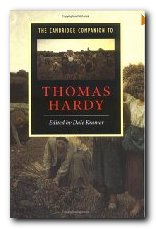 The Cambridge Companion to Thomas Hardy offers commissioned essays from an international team of contributors, comprising a general overview of all Hardy’ s work and specific demonstrations of Hardy’s ideas and literary skills. Individual essays explore Hardy’s biography, aesthetics, his famous attachment to Wessex, and the impact on his work of developments in science, religion and philosophy in the late nineteenth century. Hardy’s writing is also analysed against developments in contemporary critical theory and issues such as sexuality and gender. The volume also contains a detailed chronology of Hardy’s life and publications, and a guide to further reading.
The Cambridge Companion to Thomas Hardy offers commissioned essays from an international team of contributors, comprising a general overview of all Hardy’ s work and specific demonstrations of Hardy’s ideas and literary skills. Individual essays explore Hardy’s biography, aesthetics, his famous attachment to Wessex, and the impact on his work of developments in science, religion and philosophy in the late nineteenth century. Hardy’s writing is also analysed against developments in contemporary critical theory and issues such as sexuality and gender. The volume also contains a detailed chronology of Hardy’s life and publications, and a guide to further reading.
![]() Buy the book at Amazon UK
Buy the book at Amazon UK
![]() Buy the book at Amazon US
Buy the book at Amazon US
Other works by Thomas Hardy
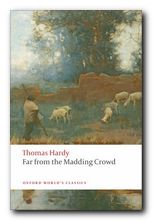 Far from the Madding Crowd (1874) was the first of Hardy’s novels to apply the name of Wessex to the landscape of south west England, and the first to gain him widespread popularity as a novelist. Heroine and estate-owner Bathsheba Everdene is romantically involved with three very different men. The dashing Sergeant Troy, who is handsome but unreliable; Farmer Boldwood, who is honourable but middle-aged; and man-of-the-soil Gabriel Oak, who is worthy and prepared to bide his time. The conflicts between them and the ensuing drama has lots of plot twists plus a rich picture of rural life.
Far from the Madding Crowd (1874) was the first of Hardy’s novels to apply the name of Wessex to the landscape of south west England, and the first to gain him widespread popularity as a novelist. Heroine and estate-owner Bathsheba Everdene is romantically involved with three very different men. The dashing Sergeant Troy, who is handsome but unreliable; Farmer Boldwood, who is honourable but middle-aged; and man-of-the-soil Gabriel Oak, who is worthy and prepared to bide his time. The conflicts between them and the ensuing drama has lots of plot twists plus a rich picture of rural life.
![]() Buy the book at Amazon UK
Buy the book at Amazon UK
![]() Buy the book at Amazon US
Buy the book at Amazon US
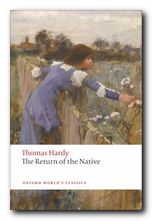 The Return of the Native (1878) It’s often said that this is one of the most Hardyesque of all the novels. There are some stand-out characters: Eustacia Vye, a heroine who patrols the moors looking out for her man through a telescope; Clym Yeobright, a hero who can’t escape his mother’s influence; and Diggory Ven, an itinerant trader who wanders in and out of the story covered in red dye. Improbable coincidences and dramatic ironies abound – and over it all presides the brooding presence of Egdon Heath. But underneath the melodrama, there are profound psychological forces at work. You need to be patient. This is one for Hardy enthusiasts – not beginners. This edition, unlike any other currently available, retains the text of the novel’s first edition, without the later changes that substantially altered Hardy’s original intentions.
The Return of the Native (1878) It’s often said that this is one of the most Hardyesque of all the novels. There are some stand-out characters: Eustacia Vye, a heroine who patrols the moors looking out for her man through a telescope; Clym Yeobright, a hero who can’t escape his mother’s influence; and Diggory Ven, an itinerant trader who wanders in and out of the story covered in red dye. Improbable coincidences and dramatic ironies abound – and over it all presides the brooding presence of Egdon Heath. But underneath the melodrama, there are profound psychological forces at work. You need to be patient. This is one for Hardy enthusiasts – not beginners. This edition, unlike any other currently available, retains the text of the novel’s first edition, without the later changes that substantially altered Hardy’s original intentions.
![]() Buy the book at Amazon UK
Buy the book at Amazon UK
![]() Buy the book at Amazon US
Buy the book at Amazon US
Thomas Hardy – web links
![]() Thomas Hardy at Mantex
Thomas Hardy at Mantex
Biographical notes, study guides to the major novels, book reviews. bibliographies, critiques of the shorter fiction, and web links.
![]() The Thomas Hardy Collection
The Thomas Hardy Collection
The complete novels, stories, and poetry – Kindle eBook single file download for £1.29 at Amazon.
![]() Thomas Hardy at Project Gutenberg
Thomas Hardy at Project Gutenberg
A major collection of free eTexts in a variety of digital formats.
![]() Thomas Hardy at Wikipedia
Thomas Hardy at Wikipedia
Biographical notes, social background, the novels and literary themes, poetry, religious beliefs and influence, biographies and criticism.
![]() The Thomas Hardy Society
The Thomas Hardy Society
Dorset-based site featuring educational activities, a biennial conference, a journal (three times a year) with links to the texts of all the major works.
![]() The Thomas Hardy Association
The Thomas Hardy Association
American-based site with photos and academic resources. Be prepared to search and drill down to reach the more useful materials.
![]() Thomas Hardy on the Internet Movie Database
Thomas Hardy on the Internet Movie Database
Adaptations for the cinema and television – in various languages. Full details of directors, actors, production features, box office, film reviews, and even quizzes.
![]() Thomas Hardy – online literary criticism
Thomas Hardy – online literary criticism
Small collection of academic papers and articles ‘favoring signed articles by recognized scholars and articles published in peer-reviewed sources’.
![]() Thomas Hardy’s Wessex
Thomas Hardy’s Wessex
Evolution of Wessex, contemporary reviews, maps, bibliography, links to other web sites, and history.
© Roy Johnson 2010
More on Thomas Hardy
More on the novella
More on literary studies
More on short stories
